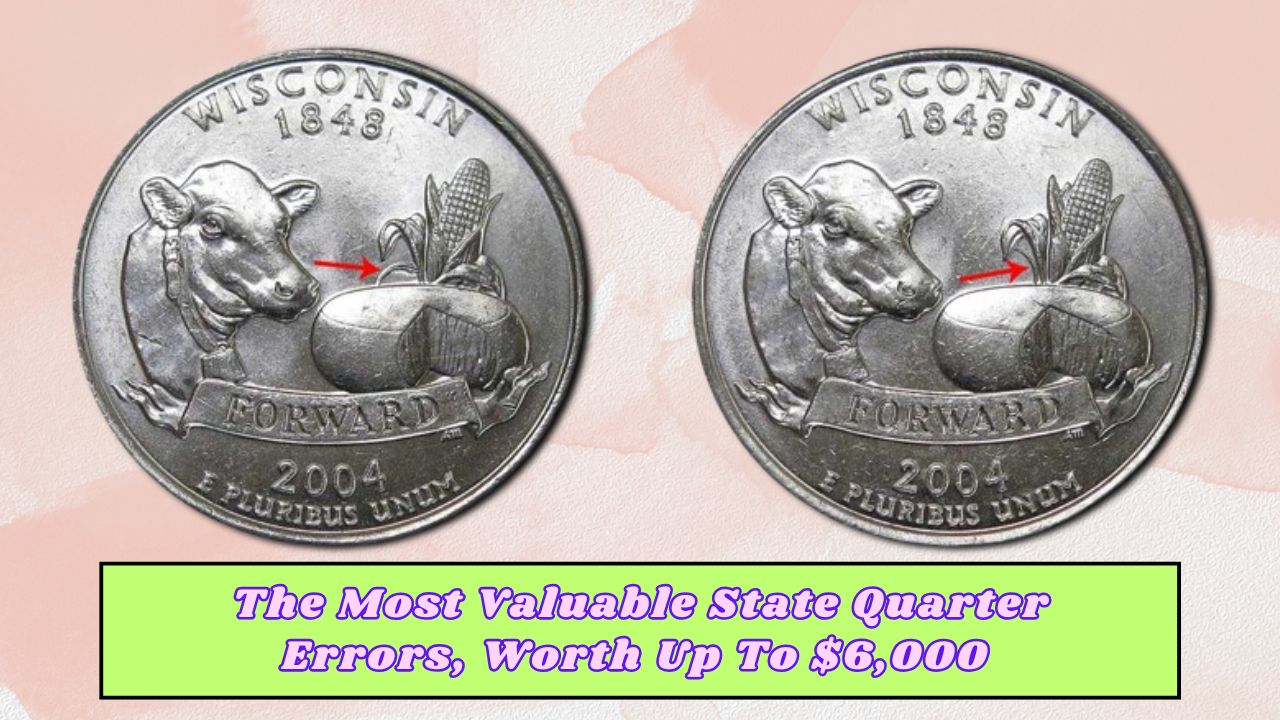Before tossing a state quarter into a vending machine or parking meter, take a closer look. While most statehood quarters are worth their face value, some rare errors can make them significantly more valuable—sometimes fetching thousands of dollars from collectors.
Let’s explore some of the most valuable state quarter errors and what makes them so special.
List of the Most Valuable State Quarter Errors
State quarter errors are highly prized by collectors for their rarity and uniqueness. Variations in minting processes, such as die misalignments or planchet anomalies, can create valuable coins. Here are some of the most sought-after state quarter errors:
| State Quarter Error | Value |
|---|---|
| 2004-D Wisconsin with an extra leaf (low) | $6,000 |
| 2009-D District of Columbia with doubled die obverse | $3,055 |
| 2004-D Wisconsin with an extra leaf (high) | $2,530 |
| 1999-P Georgia on experimental planchet | $2,160 |
| 2005-P Minnesota with doubled die reverse | $660 |
| 2005-S Kansas with dented bison | $288 |
| 1999-D Georgia with rotated reverse | $200 |
| 2007-P Wyoming with doubled die reverse | $168 |
Spotlight on Rare State Quarter Errors
2004-D Wisconsin State Quarter With an Extra Leaf (Low)
The Wisconsin quarter, featuring a cow, cheese, and corn, has a rare variation with an extra “low” leaf on the corn. This anomaly may have been caused by a tool pressing into the coin’s die. These coins can sell for up to $6,000.
2009-D District of Columbia Quarter With Doubled Die Obverse
On this coin, the obverse (heads side) shows George Washington’s profile with a doubling effect on the image and text. The subtle shadowing caused by the doubled die makes this coin incredibly rare, with one selling for $3,055.
2004-D Wisconsin State Quarter With an Extra Leaf (High)
Similar to the low-leaf version, this error features an extra “high” leaf on the corn. While slightly less common, these coins are equally valuable, with an auction record of $2,530.
1999-P Georgia State Quarter on Experimental Planchet
An experimental Sacagawea dollar planchet was accidentally used to mint some Georgia quarters, resulting in coins with unusual coloring and metal composition. One such error sold for $2,160.
2005-P Minnesota State Quarter With Doubled Die Reverse
The reverse side of the Minnesota quarter shows a person fishing on a lake. In some coins, a doubled die created a shadow effect or even an extra tree in the design. These coins have fetched as much as $660.
2005-S Kansas State Quarter With Dented Bison
The Kansas quarter’s image of a bison occasionally appears with a dent on its flank, a rare error that collectors value. One example sold for $288.
1999-D Georgia State Quarter With Rotated Reverse
This Georgia quarter error features a rotated reverse, where the back design is misaligned with the front. Coins with this error sold for about $200.
2007-P Wyoming State Quarter With Doubled Die Reverse
The Wyoming quarter, showcasing a horse and rider, sometimes displays a doubled die reverse error, causing shadowing on the text and image. These coins have sold for $168.
How to Spot Valuable State Quarter Errors
Identifying valuable errors requires a keen eye and some basic knowledge. Here are tips for spotting state quarter errors:
- Odd Colors: Quarters with unusual hues, such as a gold tone, may have been struck on an experimental planchet.
- Echoes and Shadows: Doubling of text or images indicates a doubled die error.
- Artifacts: Familiarize yourself with normal designs to spot anomalies, like extra elements in the image.
- Misalignment: Flip the coin to see if the heads and tails are properly aligned.
- Missing Text: Look for coins with faint or missing inscriptions, often caused by grease on the die.
- Cracks: Small cracks or lines can indicate a damaged die used during minting.
The Joy of Collecting Rare State Quarters
Statehood quarters are fascinating to collect, especially when hunting for errors. These rare coins not only tell a story of their creation but also hold significant value for collectors. Keep an eye on your pocket change—you might just find a hidden treasure!
My Name is Chris Mueller , I Work as a Content Writer for Sugyan and I like Writing Articles
